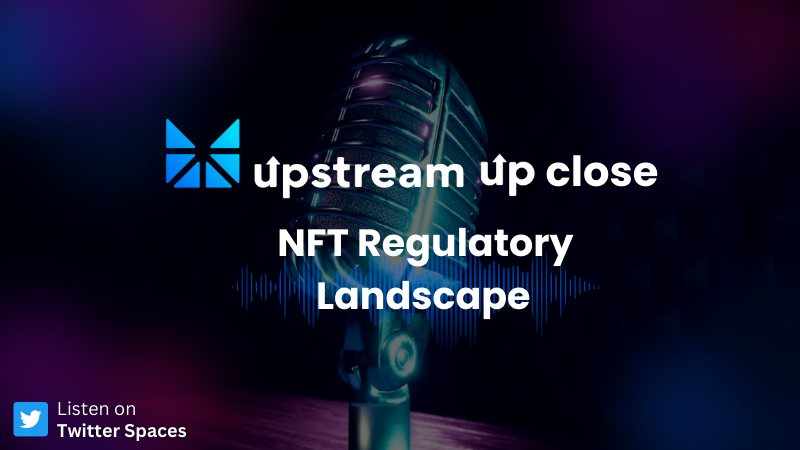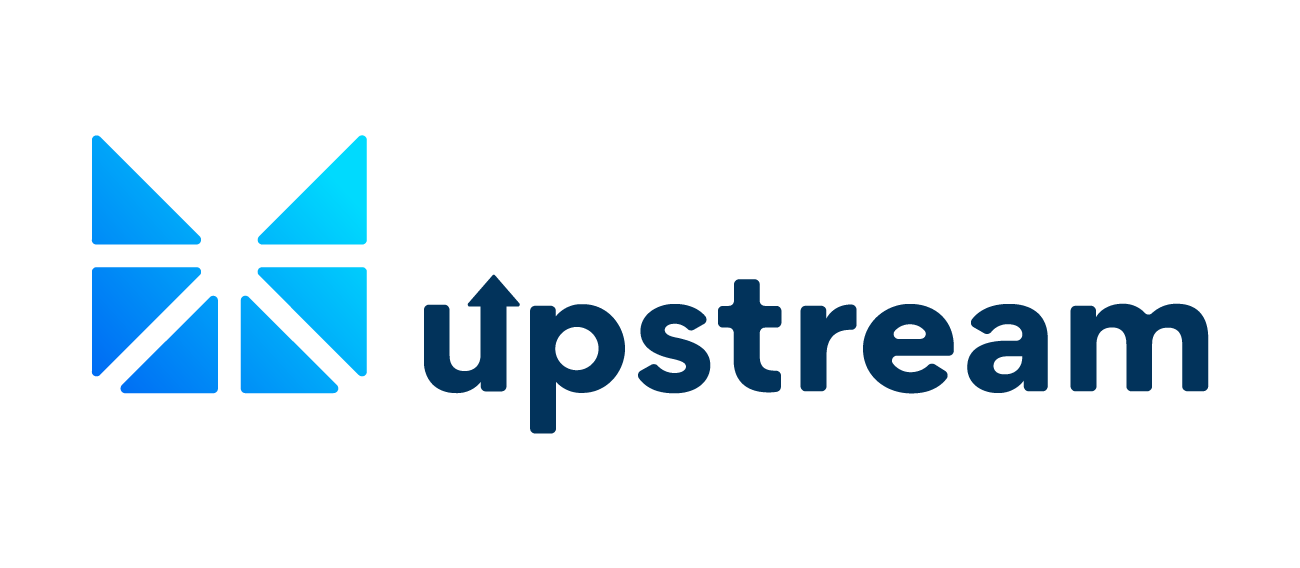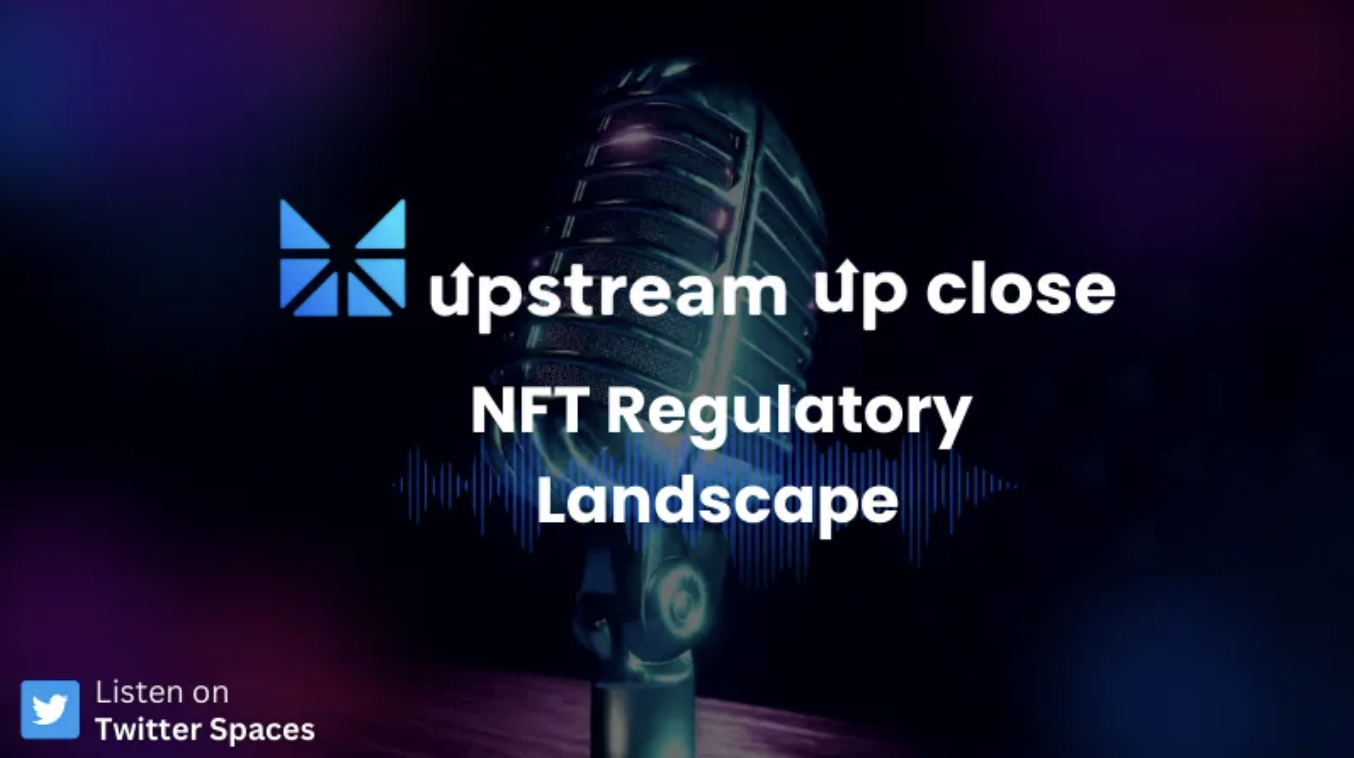An Upstream Up-Close recap on crypto, blockchain, and the implications it may have for NFT regulation

By Fernanda De La Torre
Last week, the Upstream team published the fourth episode of their new Twitter Spaces series, ‘Upstream Up Close’, featuring 10–15-minute conversations about NFTs, blockchain, and trading on Upstream. The fourth episode explores the current regulation landscape and its potential implications for the NFT market.
Listen HERE to Upstream Up Close: NFT regulatory landscape
Leading the conversation was Vanessa, Upstream’s Head of Marketing; Amanda, Client Success Manager; and Anastasia and Fernanda, Digital Marketing Specialists. We discussed reports of regulation surrounding the NFT market and the implications it could have on the NFT market in the future.
Recent regulations surrounding the NFT market
Some of the recent regulatory actions we’ve seen in the last year include the SEC examination of Yuga Labs Inc., the creator of the popular Bored Ape Yacht Club NFT collection.¹
As a quick refresher, this collection is made up of 10,000 PFP or profile picture NFTs. Each NFT features a Bored Ape, constructed from a combination of around 170 traits. Regulators were investigating whether the sales of these digital assets comply with federal law and whether some NFTs should be subject to the same disclosure regulations as stocks.
Despite the artistic and club access component of the BAYC collection, there seems to be a speculative component involved for these high-priced NFTs, where users might expect a profit depending on how the brand does.
Additionally, Dapper Labs, the group behind NBA Top Shot, has been trying to have their case dismissed for two years now. United States District Court Judge Victor Marrero stated the NFTs on Top Shot platform may be considered unregistered securities rather than fan products. The judge’s ruling suggests that the arguments in the case hold in part because the Flow blockchain behind NBA top shot acts as a “private” network as opposed to a public one like the Bitcoin blockchain.²
On January 1, 2021, Congress passed the Anti-Money Laundering Act of 2020 as part of the National Defense Authorization Act, with the biggest changes to the Bank Secrecy Act in two decades. This includes a new law requiring antiquity dealers to comply with the requirements of the Bank Secrecy Act. Art dealers have to adopt AML programs designed to combat money laundering and fraud. This law has since extended its scope to crypto exchanges.³
The Bank Secrecy Act requires U.S. financial institutions to incorporate policies and procedures that work to combat money laundering alongside the government. AML compliance programs for financial institutions are governed by FINRA which sets minimum standards for firm’s written AML compliance programs.⁴
Then In October 2022, The U.S. Treasury Department’s Financial Crimes Enforcement Network or (“FinCEN”) and Office of Foreign Assets Control or (“OFAC”) settled enforcement actions with cryptocurrency exchange, Bittrex. They found that Bittrex failed to maintain an effective Bank Secrecy Act/Anti-Money Laundering program from 2014 to 2018.⁵
The NFT market exists in a legal gray area so it’s important to pay attention to the actions in the surrounding crypto, blockchain ecosystem. There have also been a handful of other actions against prominent crypto platforms and exchanges that could very well trickle down to the NFT market.
Additional key points discussed throughout the conversation:
- Fractionalized NFTs are typically being flagged, these NFTs work by breaking an NFT into smaller part which enables users to buy into pricier NFTs for less. Since fractional NFTs let people own a fraction of an asset, they could be classed as stocks.
- The Howey Test has been the legal doctrine for determining whether transactions are investment contracts. Under the Howey Test, a transaction qualifies as a security if it involves an investment of money, it’s in a common enterprise, has a reasonable expectation of profit, or if its derived from the efforts of others.⁶
- Some groups promoting Bored Ape Yacht Club were sued for artificially inflating the value of the collection At Upstream we are all for proper disclosure so users can make informed decisions about the assets they’re interested in participating in. Hiding payment for promotion raises big concerns about transparency and market manipulation. Both things that blockchain technology works to make better in today’s markets.
- Platforms like OpenSea, Blur, Rarible, and others may face pressure from regulators to register as securities exchanges. However, it’s anticipated that many of these marketplaces may choose not to comply or be slow in registering.
Potential regulation concerns
As the NFT ecosystem continues to evolve, policymakers and regulators are facing key policy issues that require careful consideration.
One of the key policy issues surrounding NFTs is the need for appropriate financial regulation. With the growing value potential of NFTs, it’s crucial to ensure that brands and consumers are protected. This includes establishing measures to prevent fraud, enhance transparency, and promote fair trading practices.
Another significant policy concern is intellectual property (IP) rights. NFTs enable the tokenization of digital assets, including artwork, music, and collectibles. This makes it essential to address how IP rights are protected and enforced within the NFT space. It ensures artists and creators are fairly compensated for their work.
Consumer protection is also a critical consideration. NFT transactions involve digital assets with inherent value, and consumers should be informed about their rights, risks, and the terms of their purchases. Establishing clear guidelines and standards for disclosure and dispute resolution is essential to safeguarding consumer interests.
Privacy and content moderation are additional policy challenges. NFT platforms and marketplaces handle personal data, and the content associated with NFTs can vary widely. Striking a balance between privacy protection and ensuring compliance with regulations is crucial. Additionally, establishing guidelines for content moderation to prevent illegal or harmful NFTs from circulating is an ongoing effort.
Upstream’s methodology
Upstream has always been proactive in adopting a compliance-first approach. We believe that regulation is not a matter of “if,” but “when.”
What sets Upstream apart is that it’s a MERJ exchange market, which is a regulated securities exchange that has proactive compliance measures in place. While other unregulated NFT marketplaces may face challenges with incoming regulations, Upstream already supports both primary NFT sales and secondary NFT trading.
Upstream has already integrated compliance checks to combat NFT market manipulation. We’re also prepared to support fractionalized or securities-type NFTs if the need arises.
Upstream’s forward-thinking approach is crucial in this evolving regulatory landscape. We want to provide a trusted beacon for brands, artists, and creators to navigate the NFT market safely and with confidence.

If you missed the episode or you’re interested in learning more about the regulatory landscape of NFTs, listen anytime, anywhere by clicking the link above.
Stay tuned for future episodes of Upstream Up Close, in which we will continue to discuss the ever-changing world of blockchain and NFTs.
Sources
1 Decrypt |2 CoinDesk |3 Crowell |4 Finra |5 U.S. Dept of the Treasury | 6 Embroker
Disclaimers
This communication shall not constitute an offer to sell securities or the solicitation of an offer to buy securities in any jurisdiction where such offer or solicitation is not permitted.
NFTs have no royalties, equity ownership, or dividends. NFTs are for utility, collection, redemption, or display purposes only. Anyone may buy and sell NFTs on Upstream.
*U.S. or Canadian-based citizens or permanent residents may only deposit, buy, or sell securities on Upstream after being introduced by a licensed broker-dealer. Note that U.S. or Canadian-based investors include those U.S. or Canadian citizens who may be domiciled overseas. All orders for sale are non-solicited by Upstream and a user’s decision to trade securities must be based on their own investment judgement. Anyone may buy and sell NFTs on Upstream.
Upstream is a MERJ Exchange market. MERJ Exchange is a licensed Securities Exchange, an affiliate of the World Federation of Exchanges, a National Numbering Agency and member of ANNA. MERJ is regulated in the Seychelles by the Financial Services Authority Seychelles, https://fsaseychelles.sc/ an associate member of the International Association of Securities Commissions (IOSCO). MERJ supports global issuers of traditional and digital securities through the entire asset life cycle from issuance to trading, clearing, settlement, and registry. It operates a fair and transparent marketplace in line with international best practices and principles of operations of financial markets. Upstream does not endorse or recommend any public or private securities bought or sold on its app. Upstream does not offer investment advice or recommendations of any kind. All services offered by Upstream are intended for self-directed clients who make their own investment decisions without aid or assistance from Upstream. All customers are subject to the rules and regulations of their jurisdiction. By accessing the site or app, you agreed to be bound by its terms of use and privacy policy. Company and security listings on Upstream are only suitable for investors who are familiar with and willing to accept the high risk associated with speculative investments, often in early and development stage companies. There can be no assurance the valuation of any particular company’s securities is accurate or in agreement with the market or industry comparative valuations. Investors must be able to afford market volatility and afford the loss of their investment. Companies listed on Upstream are subject to significant ongoing corporate obligations including, but not limited to disclosure, filings, and notification requirements, as well as compliance with applicable quantitative and qualitative listing standards.
Forward-Looking Statements
This communication contains “forward-looking statements.” Such statements may be preceded by the words “intends,” “may,” “will,” “plans,” “expects,” “anticipates,” “projects,” “predicts,” “estimates,” “aims,” “believes,” “hopes,” “potential,” or similar words. Forward-looking statements are not guarantees of future performance, are based on certain assumptions, and are subject to various known and unknown risks and uncertainties, many of which are beyond the Company’s control, and cannot be predicted or quantified, and, consequently, actual results may differ materially from those expressed or implied by such forward-looking statements. Such risks and uncertainties include, without limitation, risks and uncertainties associated with (i) difficulties in obtaining financing on commercially reasonable terms; (ii) changes in the size and nature of our competition; (iii) loss of one or more key executives or brand ambassadors; and (iv) changes in legal or regulatory requirements in the markets in which we operate. The Company assumes no obligation to publicly update or revise its forward-looking statements as a result of new information, future events or otherwise.Nft

